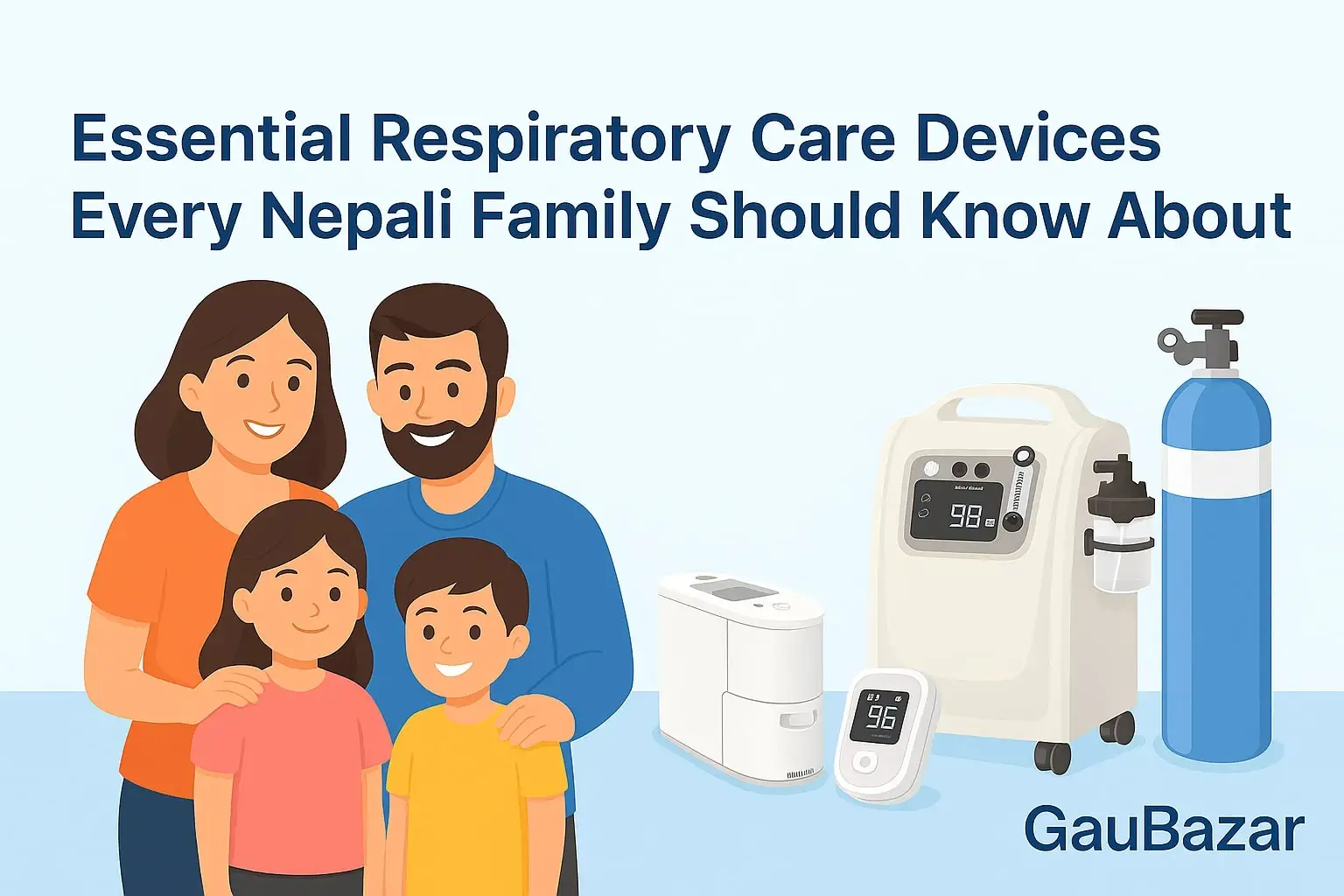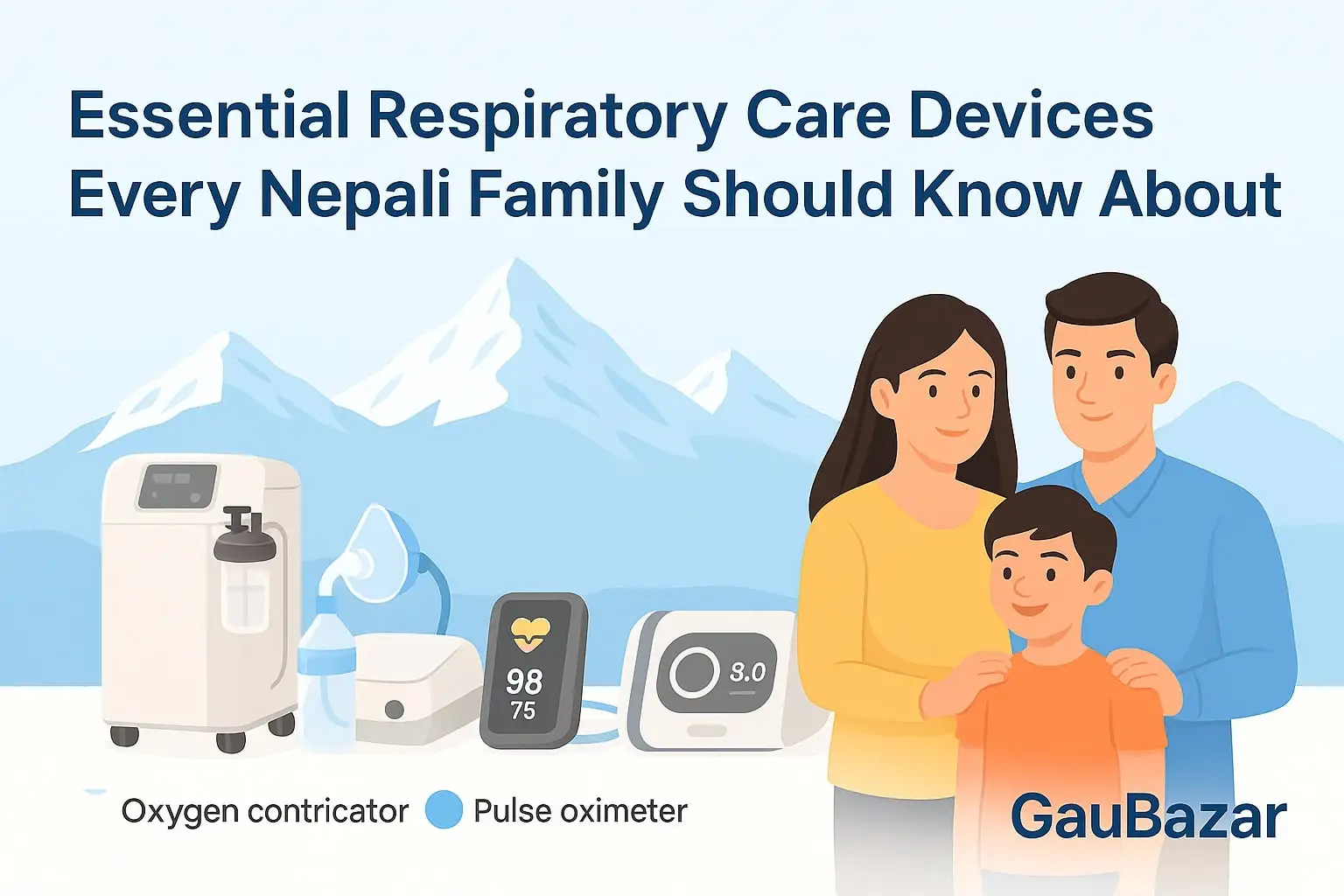Breathing is something we rarely think about—until it becomes difficult. Across Nepal, respiratory problems have become more common due to rising pollution, seasonal illnesses, dust exposure, altitude changes, and long-term health conditions. Families who once relied entirely on hospitals now recognize the value of understanding basic respiratory tools for early monitoring, comfort, and emergency preparedness.
This guide explains the respiratory care devices every Nepali household should know about—what they are used for, when they matter, and how they support home-based respiratory care.
This is not a product review or buying guide.
It is an education-first resource designed to help families make informed decisions.

Why Respiratory Care Is Becoming Important in Nepal
Nepal’s environment and living conditions naturally affect lung health:
Environmental Factors
- Dust-filled city roads
- Smog and vehicle pollution
- Seasonal wildfires
- Exposure to smoke from cooking and burning waste
Geographical Factors
- High altitude, causing lower oxygen levels
- Cold climates that worsen respiratory infections
Health & Lifestyle Factors
- Increasing asthma in children
- High smoking rates in both urban and rural areas
- Post-COVID lung weakness
- Occupational exposure (construction, brick kilns, factories)
Together, these create conditions where respiratory awareness is essential for every family.
Early Signs a Family May Need Respiratory Support Tools
Understanding symptoms early prevents emergencies.
Families often need respiratory tools when they notice:
Breathing Symptoms
- Sudden breathlessness
- Chest tightness or discomfort
- Wheezing or noisy breathing
- Difficulty taking deep breaths
Sleep-Related Symptoms
- Loud snoring
- Pauses in breathing
- Waking up gasping or choking
Oxygen-Related Symptoms
- Fatigue during simple activities
- Bluish lips or fingertips
- Oxygen saturation dropping below the safe range
Illness Indicators
- Persistent cold or cough
- Repeated chest infections
- Doctor recommending at-home monitoring or therapy
Recognizing these signs helps families respond confidently and appropriately.
Essential Respiratory Devices Nepali Households Should Understand
Below are the devices commonly used in Nepali homes.
Each one is explained by purpose only, avoiding technical detail, prices, or buying guidance (covered on your main pages).
Oxygen Concentrator in Nepal
Used when stable, continuous oxygen therapy is prescribed.
Doctors prescribe oxygen concentrators when oxygen levels remain low, especially in cases like chronic lung disease, severe pneumonia recovery, or long-term breathing difficulty.
They help maintain comfort and oxygen stability at home without the need for refills.
Families often come across this solution during long-term respiratory treatment or elderly care. Buy Online Oxygen Concentrator in Nepal
Oxygen Cylinder in Nepal
Used for urgent, short-term, or emergency oxygen support.
Cylinders are essential backups when oxygen is needed immediately—for example, sudden breathing difficulty or emergencies during power cuts. They are commonly kept in homes where high-risk patients may require urgent oxygen.
They’re not meant for routine daily therapy, but for critical readiness. Buy Online Oxygen Cylinder in Nepal
Nebulizer Machine in Nepal
Used when medication must be inhaled directly into the lungs.
Nebulizers are widely used for asthma, wheezing, severe cough, respiratory infections, and pediatric breathing support. They deliver medication as a gentle mist, making it easier for the lungs to absorb.
A nebulizer is not an oxygen machine—it is a medication delivery system, especially important for children and elderly patients. Buy Online Nebulizer in Nepal
Pulse Oximeter in Nepal
Used to monitor oxygen saturation (SpO₂) levels safely at home.
A pulse oximeter helps families check whether breathing issues are mild or serious. It is essential for people with respiratory infections, chronic illnesses, or during post-COVID recovery.
It offers immediate clarity when a patient’s breathing seems unusual. Buy Online Pulse Oximeter in Nepal
CPAP & BiPAP Machine in Nepal
Used for sleep-related breathing problems like sleep apnea.
These devices are prescribed when someone experiences:
- Loud snoring
- Interrupted breathing during sleep
- Frequent choking awakenings
- Daytime exhaustion
- Low nighttime oxygen levels
CPAP/BPAP machines help maintain airway stability and prevent long-term oxygen and heart-related stress. Buy online CPAP & BiPAP Machine in Nepal
Choosing the Right Device Depends on the Condition—Not the Machine
Families often get confused about which device to use.
Here is the simplest, safest way to understand:
- Low oxygen levels? → Use doctor-prescribed oxygen therapy.
- Asthma or wheezing? → Nebulizer delivers medication.
- Sleep breathing issues? → CPAP/BPAP required.
- Unsure what’s happening? → Check with a pulse oximeter.
- Emergency breathlessness? → Seek medical help immediately.
The device should match the medical condition, not guessing or convenience.
Universal Safety Tips for Respiratory Devices
Regardless of which device you use:
- Follow your doctor’s instructions
- Keep equipment clean and dry
- Avoid high dust or smoke environments
- Never increase oxygen flow on your own
- Store oxygen cylinders safely and upright
- Maintain good ventilation around concentrators
- Use stabilizers or backup power safely
- Learn basic emergency steps in advance
These universal safety habits prevent risks and ensure effective care.
When to Seek Medical Help Immediately
Home care tools support breathing—but they are not substitutes for medical evaluation.
Seek urgent medical help if there is:
- Severe or worsening breathlessness
- Oxygen saturation below safe levels
- Blue or gray lips/fingertips
- Inability to speak full sentences
- Confusion or unusual behavior
- High fever with breathing distress
- Breathing pauses during sleep
- No improvement despite home care
Quick medical attention can save lives.

Conclusion: Empowering Nepali Families With Respiratory Awareness
Respiratory care isn’t about collecting devices—it’s about understanding when and why each tool matters. These devices help families monitor, manage, and respond to breathing challenges confidently, especially in a country where altitude, pollution, and seasonal infections create unique respiratory risks.
With the right awareness and trusted sources like GauBazar, Nepali families can stay prepared, informed, and supported during any respiratory situation.
